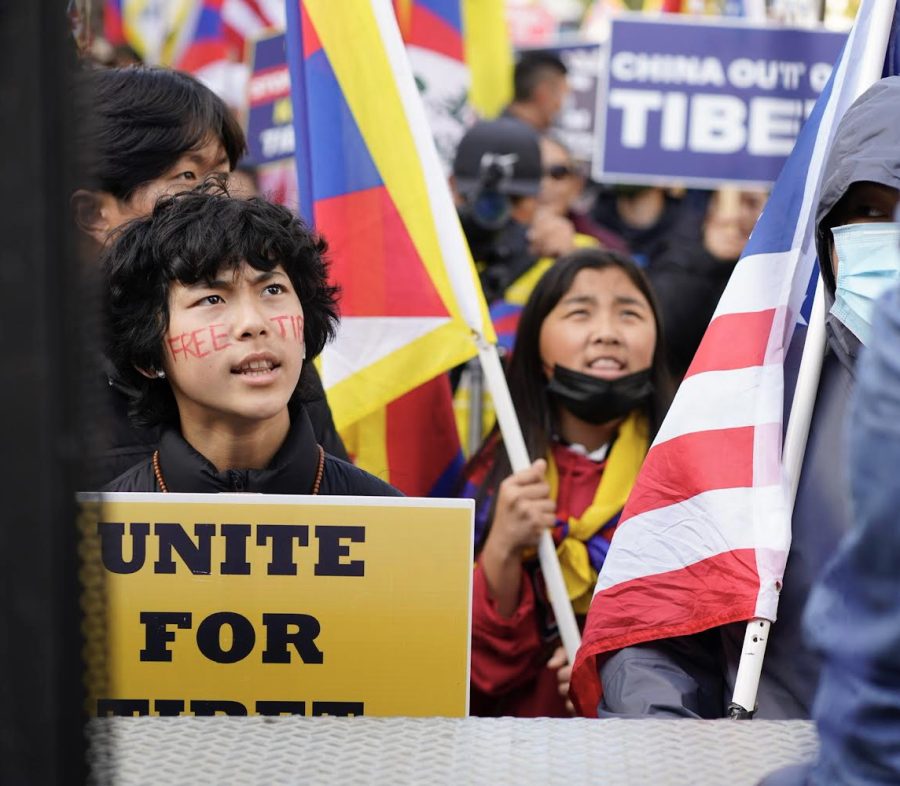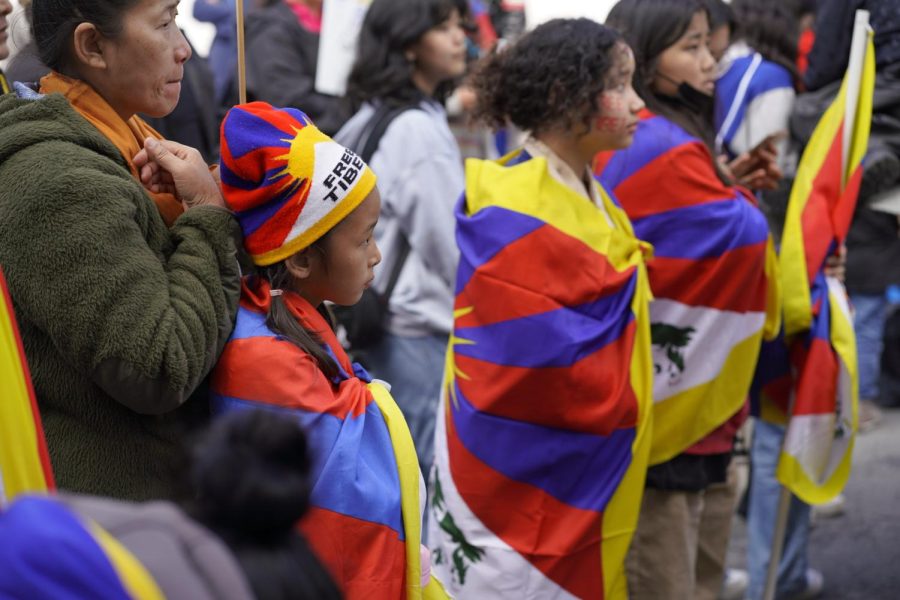Tibetan students protest during a demonstration on March 10, 2023, the 64th anniversary of the Tibetan Uprising Day.
Taking back Tibet
Students for a Free Tibet fights for Tibetan independence
May 23, 2023
“I’m Tibetan”
“Oh, so you’re technically Chinese?”
Tsering Dickey, a junior and the vice president of the Bay Area chapter of Students for a Free Tibet, isn’t a stranger to such implicitly biased remarks.
“One specific time that I remember [this incident] is during an International Fair,” Dickey said. “Even after I explained that I was Tibetan, people would still say things like ‘are you sure you’re not Chinese or Korean?”
However, Dickey does use the ignorance and misrepresentation that she experiences as fuel for her fight for Tibetan independence and raising awareness.
“Tibet was illegally occupied by the Chinese government and so we just really want to fight for human rights because that’s something that’s being violated constantly,” Dickey said. “There’s not a lot of media coverage about it — no one really knows about the situation in Tibet, so that’s just what we really want to advocate.”
Sveta Lee, a student at Columbia and one of the founders of the SFT group at the university, has been studying the Tibetan language and international law. She explains how the current People’s Republic of China has never had control over Tibet, and therefore its claims of Tibet are invalid.
“China’s claim of Tibet being a part of it is primarily based on the Mongolian Dynasty and Manchu Qing dynasty, based on Tibet’s close ties with these non-Chinese dynasties,” Lee said. “But none of these dynasties actually had anything to do with China or the Chinese rulers and no evidence exists to indicate that Mongols or Manchus integrated the Administration of China and Tibet or gave Tibet to China.”
The fight for Tibetan independence traces back to the “One China” principle that the Chinese Communist Party still holds to be true to this day. This principle states that there is only one sovereign state under the name of China, therefore challenging the sovereignty of territories like Tibet.
“As Tibetans, we don’t want our culture to be erased,” said Tenzin Dechen, junior at Albany High School and co-vice president with Dickey of the local SFT chapter.
Dechen says the erasure of Tibetan sovereignty and identity continues to this day. Over the past few months, the Chinese government has been making headlines for its strikingly similar actions to the United States’s past mistreatment of Native Americans. This is because of the common main objective of cultural erasure and assimilation, according to the Smithsonian Institution and Time Magazine.
“Most recently, there have been Chinese colonial boarding schools where Tibetan children [are] getting separated from their family and are only being taught Mandarin and are not being allowed to learn about their own identity of Tibetan,” Dechen said.
“The majority of Tibetan children grow up speaking only Chinese, so they’re forgetting their own language,” Lee said. “Basically, most of the culture they can access is like China approved version like songs and dance.”
According to the report by the Human Rights Watch, the CCP government has also been taking DNA samples from many Tibetan people and using them without their consent for surveillance and “crime detection” systems.
“Thermo Fisher’s this really big scientific company in the US, and they were aiding China by sending over DNA kits,” Dickey said. “They [China] were using those DNA kits to illegally take DNA from Tibetans and other minorities like the Uyghurs to use them without consent.”
SFT has held protests in response against Thermo Fisher, most recently on February 3 at the Thermo Fisher Scientific office in San Francisco.
“We created ‘Hands-off our DNA’ posters and signs and protested in front of a Thermo Fisher building,” Denchen said. “We also had a bunch of students holding up signs at schools.”
SFT has also been engaging in lobbying efforts with U.S. representatives.
“SFT kind of provided some financial aid for us to be able to go to DC and lobby about the [Promoting a Resolution to the] Tibet-China Conflict Act,” Dechen said. “We just went to lobby to say that the conflict between China and Tibet should still be unresolved.”
Dickey initially got involved with SFT because she wanted to take action with students from the same age group as her.
“I’ve been going to Sunday Tibetan school since elementary school now, and everyone I know is somehow like a part of a group for Tibet, but for those groups, the age group is much older,” Dickey said. “So it just feels kind of awkward — I can be as comfortable and SFT is more people that are my age.”
Dickey says that her Tibetan identity has been hard to grapple with since there are few students that she can connect culturally with.
“I’ve really struggled with it [my identity] because I’m the only Tibetan person in the district,” Dickey said. “And during International Day, and stuff like that, I would hold booths and stuff, but like no one really knew what was going on.”
Through the SFT organization and her family, she has been able to feel more comfortable with her identity.
“Over the last few years, I’ve been connecting with my grandmother a lot — she escaped Tibet during the illegal occupation,” Dickey said. “She used to not really talk about her story as much but recently she has opened up more so I feel like through her stories I’ve learned about myself.”
Tibet is still illegally occupied by China and negotiations between both parties have stalled
Dechen believes that the organization has empowered her to raise awareness about Tibetan independence and connect with others who are fighting alongside her cause.
“The most meaningful part is being able to have a platform to stand on and to say that I’m fighting for my country,” Dechen said. “There’s a lot of other kids that are also doing that and I think it’s a great platform to see that there are other people who care.”


